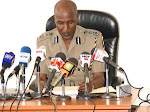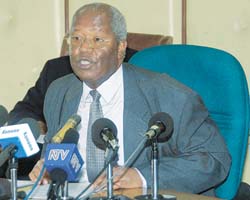 Having been asked to defend the bandit government in its times of crisis, Mungiki now feels short-changed and abandoned, we can reliably report. This morning, members of the gang were caught up in police running battles in which tear gas cannisters were lobbed to disperse them. They were protesting the incaceration of their leader Maina Njenga. We recently reported that Njenga was still Mungiki, and not many people took us seriously.
Having been asked to defend the bandit government in its times of crisis, Mungiki now feels short-changed and abandoned, we can reliably report. This morning, members of the gang were caught up in police running battles in which tear gas cannisters were lobbed to disperse them. They were protesting the incaceration of their leader Maina Njenga. We recently reported that Njenga was still Mungiki, and not many people took us seriously.
And in what is likely to hurt the PNU thugs, the BBC has learnt of allegations of state-sanctioned violence in Kenya during the recent post-poll crisis. Sources allege that meetings were hosted at the official residence of the president between the banned Mungiki militia and senior government figures. The aim was to hire them as a defence force in the Rift Valley to protect the president's Kikuyu community. The government has declined to respond to the allegations which are likely to be investigated by a new commission.
 The allegations come as parliament is due to open on Thursday preparing the way for a new coalition government. Although parliament's focus will be on healing ethnic divisions and creating a coalition government - allegations of state involvement with a banned Kikuyu militia, known as Mungiki, will not go ignored. Not least because of growing suspicion that some of the violence that led to 1,500 people being killed and hundreds of thousands displaced was orchestrated by both sides of the political divide.
The allegations come as parliament is due to open on Thursday preparing the way for a new coalition government. Although parliament's focus will be on healing ethnic divisions and creating a coalition government - allegations of state involvement with a banned Kikuyu militia, known as Mungiki, will not go ignored. Not least because of growing suspicion that some of the violence that led to 1,500 people being killed and hundreds of thousands displaced was orchestrated by both sides of the political divide.Gangs with machetes The BBC source, who is a member of the Kikuyu tribe and who is now in hiding after receiving death threats, alleged: "Three members of the gang met at State House... and after the elections and the violence the militias were called again and they were given a duty to defend the Kikuyu in Rift Valley and we know they were there in numbers."
On the weekend of 25 January, the Rift Valley towns of Nakuru and then Naivasha were the focus of the some of the worst post-election violence. Eyewitnesses spoke of non-Kikuyu homes being marked, then gangs with machetes - who they claim were Mungiki - attacked people who were from other ethnic groups. Sources inside the Mungiki have told the BBC that it was a renegade branch of the outfit that was responsible for violence, not them.
A policeman who was on duty at the time, who has spoken to the BBC on condition of anonymity, has also pointed to clear signs of state complicity. He alleges that in the hours before the violence in Nakuru, police officers had orders not to stop a convoy of minibus taxis, called "matatus", packed with men when they arrived at police checkpoints. "When we were there... I saw about 12 of them [matatus] packed with men," he said.
"There were no females... I could see they were armed. "We were ordered not to stop the vehicles to allow them to go." The current and previous minister for internal security have both been invited to respond to the allegations. So far they have declined to do so. The allegations come at a time of growing concern that there was pre-planned violence on both sides of the political fence, in the aftermath of Kenya's disputed election result.
The International Crisis Group has already raised such concerns in their report and Human Rights Watch is expected to publish its report making similar claims shortly. There are plans to establish a Truth and Reconciliation Commission in the coming weeks to examine claims of election violence. The allegations are likely to be among the themes investigated by a commission created to address the issue of post-election skirmishes.
This may be the beginning of a long drawn out war between Mungiki and the Grand Coalition. It is believed that Mungiki adherents are fearing for a merciless clampdown by the police whose minister is likely to be from the ODM. Time to go look for the warlords who helped recruit the mungiki is now. The group has been hunted down and killed before including their bodies being dumped at the Ngong Forest.













|